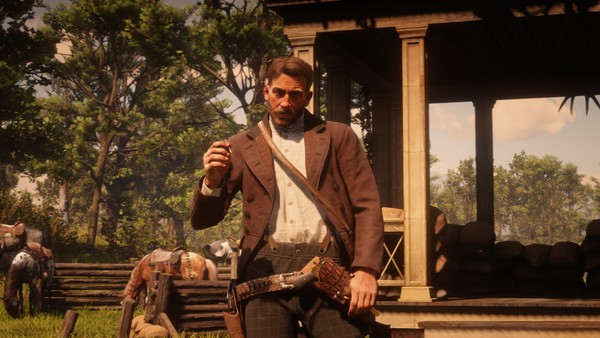Why Arthur Morgan Is The Best Video Game Protagonist Of The Generation
6. Writing, Story And Acting

In the run up to the game's release, there was the worry that Arthur was going to be the most bland character out of Dutch's gang. Was he just going to be yet another grizzled, square-jawed white dude in a sea of grizzled, square-jawed white dudes? Was he just going to be yet another extension of the player that passively takes in the stories of the people around him? To an extent, both of those assumptions indeed came true, but immediately Arthur is far more compelling than the boxes he falls into.
His journey and redemption is superbly written, with the character himself thematically embodying the dying embers of the Old West, and a way of living that's no longer compatible in the new world. It's clear he wants elements of a normal life - stability, family, love - but the only thing he's ever known is his gang, and the violent lifestyle they all lead. You get some of this characterisation through the cutscenes, and of course it's brought to life with such energy and nuance thanks to voice actor Roger Clark, but it's only by digging a little deeper that you get a full view of who Arthur is.
Arthur's journal is particularly helpful on this front. In fact, it's here where players get true, unfiltered insight into his thoughts and feelings. From a gameplay perspective, it's puzzling to section off so much of Arthur's character into a feature many people might not even check, but narratively it makes perfect sense. His role in the camp is a trustworthy pillar who gets s**t done; he's not necessarily concerned about himself, more so making sure the only family he's ever known is thriving and well. Not only that but he still feels indebted to Dutch (who's essentially a father figure to him) after all these years, and he wants to maintain the image of the man everyone views him as. Like a lot of manly men action heroes, he's not all that keen on getting into long chats about his feelings. He's there to do his job and not complain, and it's a role he's perfected.
Unlike in cutscenes or dialogue with other characters then, in his journal, Arthur is free to be as vulnerable and as honest as he wants. Conundrums and personal failings he'd never dream about sharing are lamented over in this prose, and you get to understand the complex human behind the cliched gunslinger exterior. For instance, where he doesn't outwardly speak about his feelings after Mary leaves him for good in-game, they're laid bare in the journal, as he questions his foolishness over ever thinking he could have a "normal" life with her, all the while pondering whether he really is the ruthless criminal he's painted as.
You'd never get this added layer if you didn't regularly investigate the journal, but that makes total sense, because it's not something he'd be comfortable talking about with anyone else. The very fact that this characterisation is locked away in a book is a decision that, in itself, leads to a deeper understanding of Arthur's character.